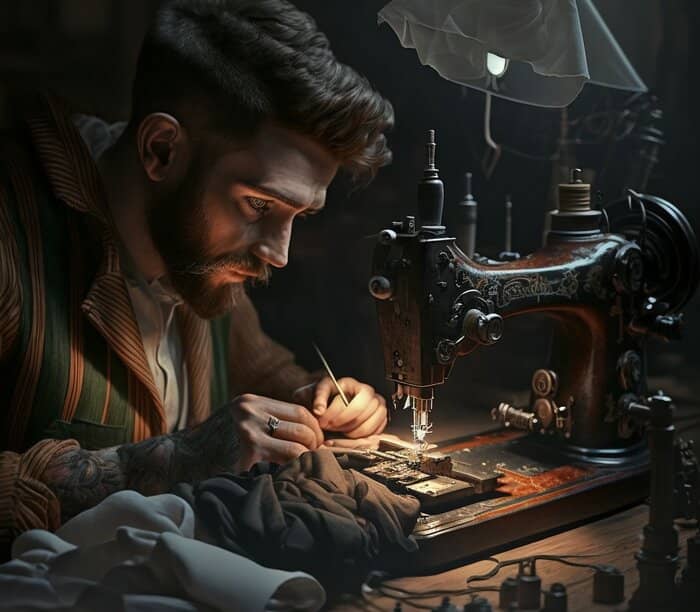The History of Gucci: From Leather Goods to Luxury Fashion
The Gucci family is one of the most iconic and well-known names in the fashion industry. The brand has been passed down through generations of the family, each leaving their own mark on the company.
From its humble beginnings as a leather goods workshop to its current status as a luxury fashion powerhouse, the Gucci family has played a vital role in shaping the brand’s history and success.
However, the family’s journey has not been without its struggles, including internal feuds and the eventual ousting of the family from the company.
Despite these challenges, the Gucci family’s legacy lives on through the continued success of the brand. In this article, we will delve into the fascinating history of the Gucci family, exploring their rise to fame, the challenges they faced, and the impact they have had on the fashion industry.
Birth of a family saga
In 1921, Guccio Gucci founded his eponymous brand with the opening of his first store in Florence. Specializing in the creation of leather goods for the equestrian world, Gucci’s workshop quickly drew the attention of nobles and members of the upper middle class.
This was in part due to Guccio’s prior experience working at the Savoy Hotel in London, where he had developed an understanding of the tastes and preferences of this elite clientele.
Guccio drew upon this knowledge, as well as the expertise of local craftsmen, to infuse his creations with the level of refinement and sophistication demanded by his discerning customers.
Transmission to new generations
In the 1940s, Guccio Gucci’s sons joined the family business, bringing with them a shared vision for the brand, embodied in the iconic intertwined “G”s. Tragically, in 1953, Guccio Gucci passed away, but his legacy lived on through the efforts of his sons.
Under their leadership, the brand began to expand internationally, opening its first stores in New York in 1953, followed by London, Paris, and Los Angeles.
Despite this expansion, Gucci remained true to its roots, continuing to rely on the expertise of its Italian craftsmen, using only the finest quality fabrics, and maintaining a steadfast commitment to luxury.
To this day, Gucci continues to uphold these core values, solidifying its position as one of the world’s most renowned luxury brands.
The Wedding of Maurizio Gucci with Patrizia Reggiani
In 1973, Maurizio Gucci, the son of Rodolfo, married the ambitious Patrizia Reggiani, which sparked a rift within his family, with many, including his own father, believing that she was only after his wealth.
Despite efforts by his father to intervene, including reaching out to the Archbishop of Milan to prevent the marriage, the two lovers were wed.
Patrizia, the daughter of a waitress from Modena, had set her sights on Ferdinando Reggiani, a wealthy Milanese businessman, who was significantly older than her.
Despite her privileged upbringing, Milanese society had shunned her family, but Maurizio was enamored with her, finding her cheeky, prickly, and reckless nature alluring.
Together, the couple became key figures in the New York jet-set, earning the nickname “Maurizia” among their social circles.
They hosted lavish parties, with colorful themes and regularly invited notable figures such as Jackie Onassis and the Kennedy brothers to their dinners.
They spent their time between their chalet in Saint-Moritz, their house in Acapulco, and their yacht, Le Créole, which Maurizio had acquired after the birth of their second daughter, Allegra, in 1981.
success and family heartbreak
In the 1980s, Gucci was experiencing worldwide success, but behind the scenes, the family was being torn apart by internal conflicts.
Upon the death of Rodolfo Gucci in 1983, his shares were passed on to his son, Maurizio, who became the majority shareholder.
This sparked a legal battle between Maurizio and his uncle Aldo, as Maurizio sought to gain complete control of the company. In 1986, Aldo lost the case, was left with only a 16.7% stake in Gucci, and was sentenced to a year in prison for tax evasion.
In 1988, Maurizio sold 47.8% of the company’s shares to the Bahrain-based investment fund, Investcorp. Aldo subsequently sold his remaining shares to Investcorp and passed away in 1990.
As President of Gucci, Maurizio was held responsible for the company’s heavy losses between 1991 and 1993, which led to him selling his remaining shares in the company in 1993.
This marked the end of the Gucci family’s involvement in the company as no family members remained among the shareholders.
The great drama
On March 27, 1995, Maurizio Gucci, grandson of Guccio Gucci and heir to the famous Italian fashion house bearing the double G, was shot on the porch of his Milan office.
Three bullets were fired, two into his back, and the third, fatal, hit him in the temple. The doorman, who witnessed the scene and was shot in the arm, rushed to help the 46-year-old man as he lay dying on the sidewalk.
Suspicion turned quickly to his former wife, Patrizia Reggiani, consumed by jealousy and obsessed with a spirit of revenge since their separation.
Their relationship had soured when Maurizio Gucci took over the family empire at his father’s death in 1983, and two years later, he left home for a business trip and never returned.
He had fallen in love with a younger woman, Paola Franchi. Patrizia’s hatred began to grow, and for ten years she refused the divorce but was forced to resolve it in 1994.
She was given custody of their two daughters, an annual pension equivalent to a little over 200,000 euros, as well as an apartment in Milan, another in New York, a 65-meter yacht, and expensive jewelry.
It was not until the beginning of 1997 that investigators unraveled the case after an informer pointed out Ivano Savioni, a 40-year-old Milanese, as the intermediary between Patrizia Reggiani and the two murderers of Maurizio Gucci, Orazio Cicala, 58, and Benedetto Ceraulo, 35. Savioni had met Patrizia through her clairvoyant, and confidante, Giuseppina Auriemma, 51. She had paid a little over 321,000 euros for the murder.
On March 17, 2000, Patrizia Reggiani was sentenced to 26 years in prison. In November of the same year, she tried to commit suicide from her cell.

